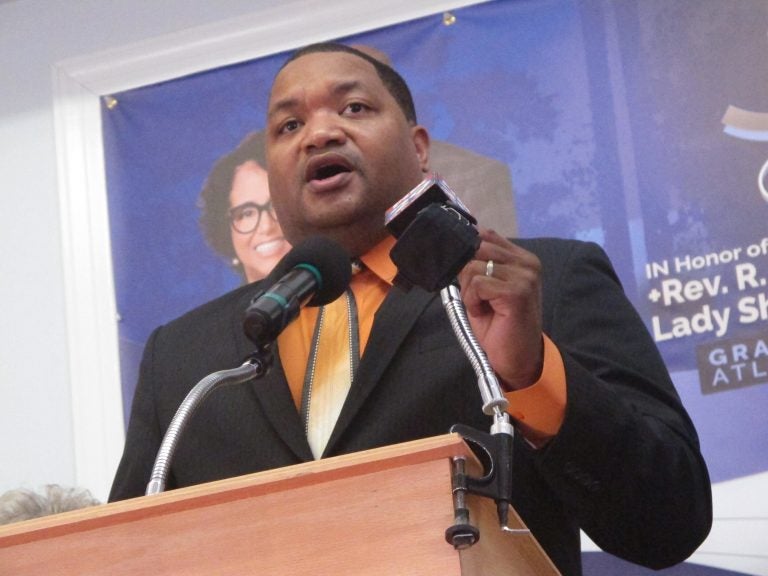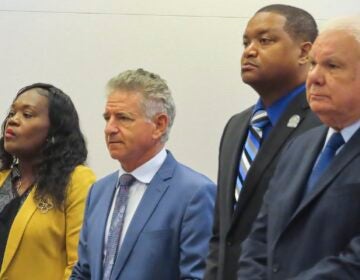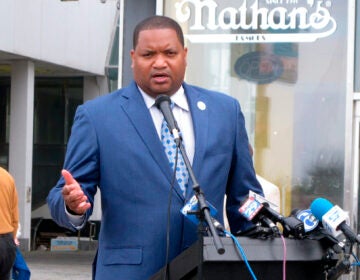Atlantic City Dems seek to block change of government vote
Atlantic City's Democratic Party is seeking to block a special election next month on whether to eliminate an elected mayor in favor of an appointed city manager

This Jan. 15, 2020, photo shows Atlantic City N.J. Mayor Marty Small speaking at a rally in his city against a proposed change of government that would replace an elected mayor with an appointed city manager. (AP Photo/Wayne Parry)
Updated 4:45 p.m.
Atlantic City’s Democratic Party is seeking to block a special election next month on whether to eliminate an elected mayor in favor of an appointed city manager, alleging canvassers forged signatures and committed other acts of fraud.
The party filed a legal challenge Tuesday, asking a judge to cancel the March 31 vote.
The party also claims the proposed change would disenfranchise voters from communities of color. Proponents of the change say it is needed to overcome decades of corruption and mismanagement in the seaside gambling resort.
The Atlantic City Democratic Committee asked Superior Court Judge Julio Mendez to cancel the election, claiming Atlantic City Residents for Good Government engaged in numerous instances of fraud, and committed errors and omissions that should have invalidated the petitions they submitted in seeking the election.
Samuel Lashman, an attorney for the Democratic Committee, asserted in court papers that proponents of the special election “used illegal, improper and fraudulent means to obtain signatures.”
In addition to technical errors, Lashman asserts that some of the petitioners were under the age of 18 or were not registered voters, both of which he said would legally preclude them from collecting petition signatures.
Mayor Marty Small, a Democrat, said proponents of the change lied and misled voters to get them to sign petitions, including asking the mother of a murder victim to sign a petition “to stop the violence.”
“There’s no way 3,000 Atlantic City residents signed this petition, fully knowing all that this ballot change entails,” he said. “There are people who haven’t lived in Atlantic City since Superstorm Sandy whose names are on these petitions. It’s not going to fly.”
The storm occurred in October 2012.
Bob McDevitt, president of the main Atlantic City casino workers union and one of the leaders of the change of government movement, denied the allegations contained in the court filing.
“This whole thing is absurd,” he said. “This is America, and they can hire a lawyer and file whatever they want. But at the end of the day, 3,000 people signed a petition seeking this change, and there’s going to be a reckoning at the ballot box, not in a courtroom.”
Under the proposed change, a mayor would be replaced by an appointed city manager, and neighborhood representation by geographic wards would be replaced by a smaller council elected in a citywide vote.
Lashman asserted that move could prevent communities of color from being represented in their city government. According to U.S. Census data, Atlantic City’s population is more than 35% black, 31% Hispanic and nearly 17% Asian.
The city has neighborhoods where ethnic or racial groups predominate and where they stand a decent chance of electing a person of color who might not prevail in a citywide vote, he wrote.
McDevitt strongly disagreed, calling such assertions “a disgrace to anyone who ever fought for civil rights.”
“What they are advocating is ethnic gerrymandering,” he said.
Supporters of the proposed government change say the effort arose from decades of frustration over corruption, high taxes, nepotism and poor municipal services in Atlantic City. The most recent former mayor appears headed for prison later this month, and the state seized most of the city’s major decision-making power nearly five years ago.
Other main backers of the change of government move include Morris Bailey, the owner of Resorts casino, and retired state Senator Raymond Lesniak, who led the legal battle that ended with New Jersey winning a U.S. Supreme Court case clearing the way for all 50 states to offer legal sports betting should they so choose.
Opponents of the move call it the latest in a long series of power grabs by outsiders who want Atlantic City’s money but don’t care about its people.
Amid the tussling between sides, uncertainty remains over whether the results of a referendum would be binding. State law allows for such results to be disregarded in a municipality under Trenton’s oversight, such as Atlantic City.
Lashman, the attorney, alluded to that provision in his court filings, noting the referendum may turn out to be an “exercise in futility.”
Representatives for the state agency in charge of the city, the Department of Community Affairs, did not immediately say whether the state would heed the results of a successful referendum.
McDevitt said he’s confident the state would do so.
“I can’t imagine any circumstance where the state would say, ‘Oh no, this form of government isn’t appropriate,’ considering there are numerous municipalities in New Jersey that are under this form of government and they’re run very effectively,” McDevitt said.
WHYY’s Nicholas Pugliese contributed reporting.
WHYY is your source for fact-based, in-depth journalism and information. As a nonprofit organization, we rely on financial support from readers like you. Please give today.




